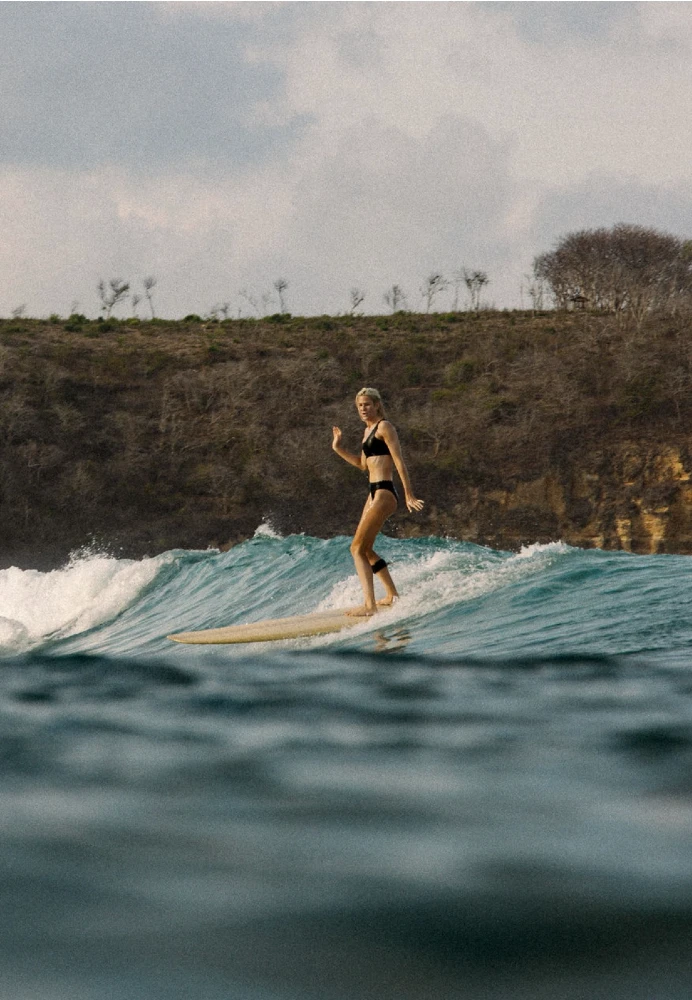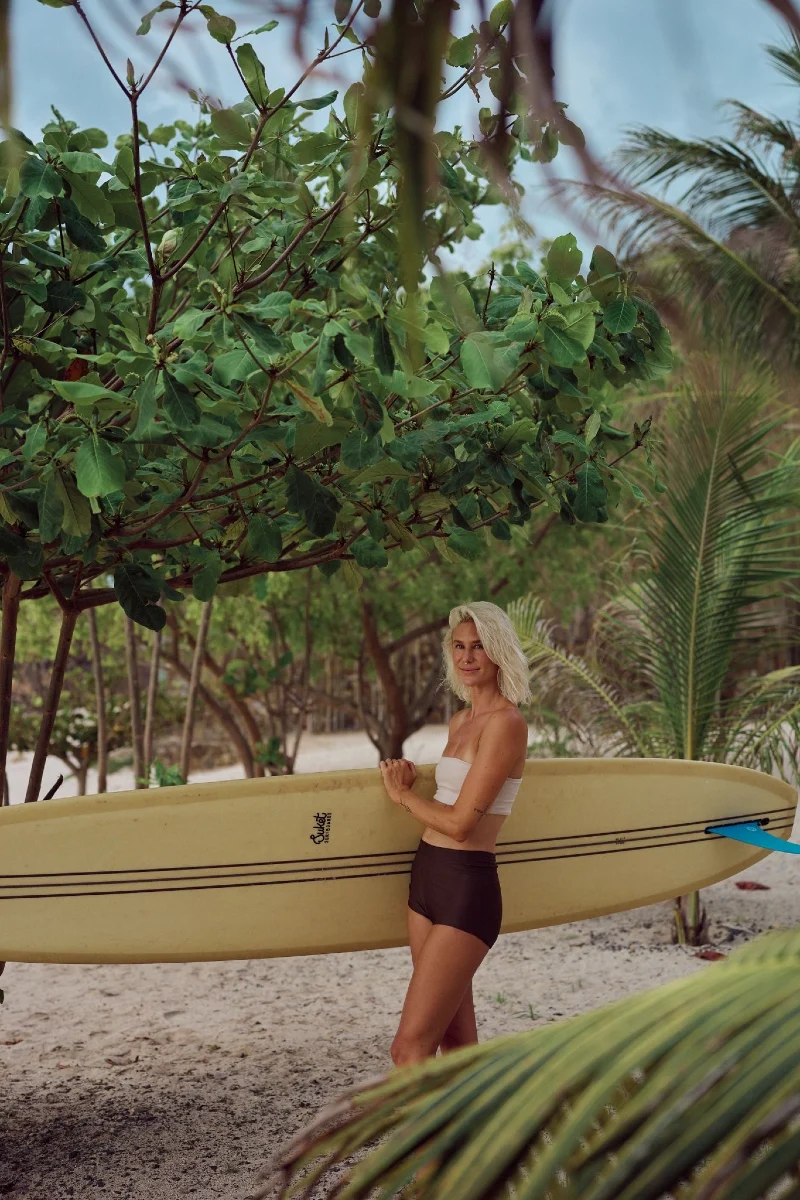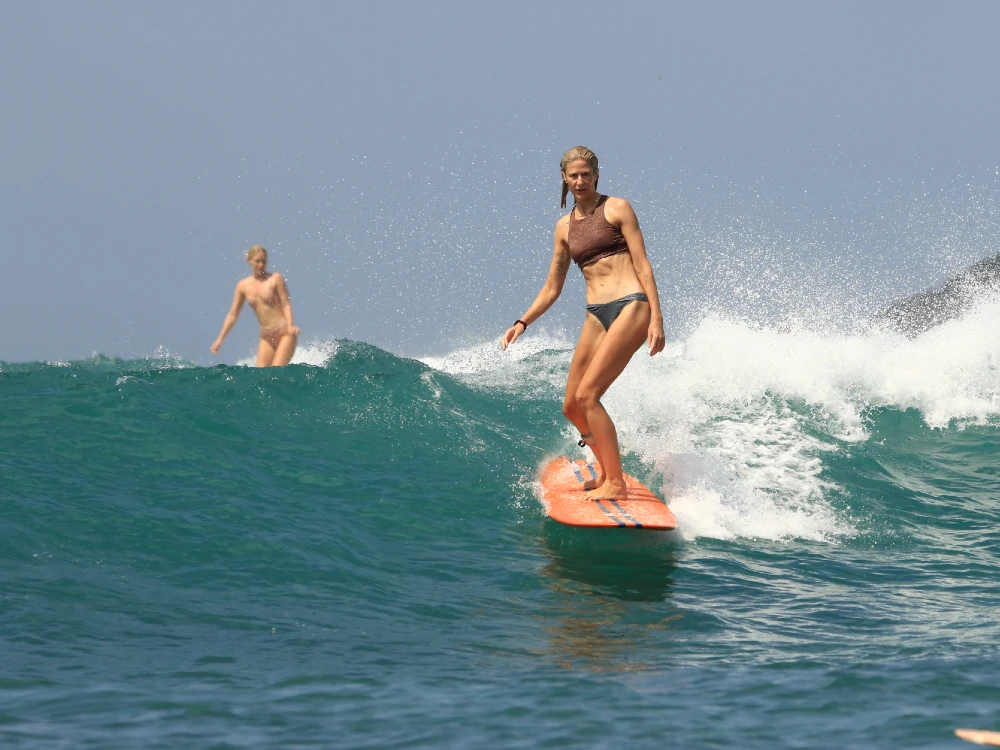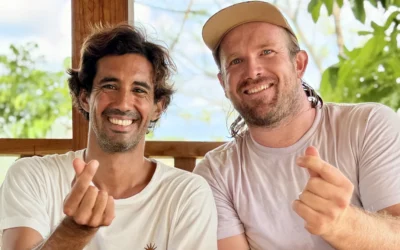Meet Dr Soph, clinical psychologist, bestselling author and mental health expert at Headspace.
We host people from all walks of life and backgrounds at Xanadu, and our guests often have interesting stories and insights to share.
Hosting someone with a background in clinical psychology and mental health was a particularly unique experience for us. And the fact Dr. Soph turned one week of vacation into a three-week surf retreat adventure made the experience even more memorable.
In this interview with the British bestselling author and mental health expert, we dive deeper into her love for surfing and how it’s shaped her life.
Rarely do we get such a profound, vulnerable and perceptive look into the inner world of someone learning to surf, and we’re stoked to share Dr. Soph’s story with you.
If you’re thinking about picking up a surfboard or you’re currently learning to surf, this interview will prove that surfing and the ocean may just be our best teachers.


Q. Hey Dr. Soph. How are you? Thanks for taking the time to chat with us today. Can you please introduce yourself?
Hi, I’m Sophie!
Work-wise I’m a Clinical Psychologist, Sunday Times Bestselling Author (that’s the British book list) and the British Mental Health Expert for Headspace.
In reality, I’m impulsive, get bored easily and travel more than my family and friends would like me to.
Q. Can you tell us about how surfing came into your life?
I went to Indonesia to scuba dive. I had planned to meet my friend, who I rarely get to see as we live in different countries, at a surf retreat for one week as a break from diving.
She had been to Xanadu before and loved it. She wanted to go back, and I wanted to see her, so I said I would join. I had a flight, a bungalow and dives booked in Raja Ampat starting the day after Xanadu finished.
However, I never got on that flight and I didn’t get my money back from my accommodation either! I just couldn’t leave Xanadu after one week. I hadn’t surfed before, but after a week I didn’t care about diving anymore—which is ridiculous.
Q. A loss for diving but a HUGE gain for us! How was your experience with Xanadu in Lombok?
Incredible, challenging, beautiful, hilarious.
The fact that I booked for one week and stayed for three (which I believe is the longest anyone has stayed at the retreat) and canceled all other plans shows how much I loved my time there.
Q. And your first surf session with us, can you recall what your self-talk was like during this lesson?
The first lesson was purely exciting. My expectations were low, so when I stood up I was delighted. So damn happy. I hadn’t expected anything and the best had happened!
The self-talk and self-doubt started building after a week or so of surfing. In fact, my self-talk got worse the better I got at surfing. The moment I was a few weeks in, my expectations of where I thought I should be kicked in.
Since learning to surf is not a linear experience—meaning it varies moment to moment—I often felt frustrated with my performance, angry at myself and sometimes walked out of the ocean swearing I would never go back: “The ocean hates me,” “I’m not built for this, I should just admit it and give up”!
Turns out I am not very good at being a beginner.
Surfing taught me this in a very humbling way! I had to work very hard on myself-talk and expectations in order to keep surfing. I will likely always have to do this as I’m a recovering perfectionist!
Q. What does working hard on yourself-talk look like?
Talking to friends was the first helpful step. It turns out a lot of people who surf feel frustrated and think they should give up from time to time.
It was a relief to hear others felt this way.
Practicing mindfulness to let go of the constant negative self-talk and release expectations helped. So did reminding myself that I was surfing for the enjoyment, the playfulness of it and the challenge of it. And also, reminding myself to be kind to myself.
I was comparing myself to people who had been surfing for months or even years longer than me, beating myself up for not being exactly like them. It was unhelpful and illogical.
Now, I try to let go of the need to perform and impress, and instead focus on the moment when I’m in the surf. The gratitude I have for getting to learn something so incredible.
If I need to compare, I look back at pictures and videos from my first weeks at Xanadu and use that as the metric for how far I’ve come.
Q. Exactly. You really need to keep an open mind when learning to surf, and comparing yourself to others isn’t helpful. What conclusions did you come to about surfing and mental health?
Personally, I’ve seen how happy surfing makes my friends and me. How a bad day can be turned around by one good wave. And how the longer we are away from water, the more we crave to be back there.
In terms of research, we know surfing has benefits that extend beyond my circle of friends!
Like other forms of exercise, it releases endorphins that boost mood and reduce symptoms of anxiety and depression. In addition to this:
- Spending time in the ocean taps into the “blue mind” effect, where being near water lowers stress and enhances feelings of calm and wellbeing
- Surfing requires complete focus, fostering a flow state that is deeply meditative and linked to improved mental health
- It’s also a physical challenge that builds resilience, teaching patience and adaptability—skills that carry over into everyday life
Beyond the personal benefits, surfing often creates a sense of community, offering social support that reduces loneliness and fosters belonging.
Research even backs its therapeutic power, with surf therapy programs showing positive results for individuals with PTSD, anxiety or depression.
Q. The blue mind is real! As for the flipside, why do you think learning to surf (or learning anything for that matter) can bring out the worst in people?
Learning to surf can be incredibly humbling, and the challenges involved often push people outside their comfort zones.
The combination of physical difficulty, the unpredictability of the ocean and the steep learning curve can trigger frustration, self-doubt or impatience.
For some, these feelings might escalate into anger or defensiveness, particularly if they tend toward perfectionism or struggle to accept failure. Being forced to confront these emotions without immediate success can bring out less constructive traits.
Additionally, the social dynamics of surfing can contribute.
Crowded lineups and the pressure to follow unwritten surfing etiquette can make beginners feel judged or excluded, intensifying insecurities.
Overall, the learning process can act as a mirror, reflecting unresolved inner struggles or highlighting areas where emotional resilience and self-compassion might need growth.
I know it has done this for me, so no judgment toward anyone who finds themselves struggling with these things.
Q. Do you think these negative emotions and behaviours are normal for beginners?
Yes, for sure.
Q. Are certain people more prone to negativity when learning to surf than others?
Certainly. Perfectionists may struggle with inevitable failures and slow progress, leading to frustration and self-criticism.
Highly competitive individuals might feel jealous or inferior when comparing themselves to others, while those with a low tolerance for uncertainty may find the unpredictability of the ocean unsettling, provoking anxiety.
Similarly, impatient or impulsive personalities may become frustrated with the patience and persistence required to improve.
These traits can make the learning process more challenging but also offer valuable opportunities for personal growth.
Q. Do you have advice for people who want to approach learning to surf in a healthy and balanced way?
To learn surfing in a healthy and balanced way, it’s important to set realistic expectations and understand that progress takes time.
Celebrate small victories, like catching your first wave or improving your paddling, rather than striving for perfection. Practice self-compassion by accepting mistakes as a natural part of learning and speaking to yourself with kindness.
Focus on enjoying the journey, appreciating the simple joys of being in the ocean and challenging yourself, rather than fixating solely on the outcome. Stay present by focusing on each wave, which can help foster mindfulness and reduce overthinking.
Learning with friends or in a beginner-friendly group can provide encouragement and make the experience more enjoyable.
Building physical endurance and maintaining a positive mindset will help you feel prepared, while acknowledging and confronting fears can prevent them from holding you back.
By approaching surfing with patience, curiosity, and openness, you’ll not only improve your skills but also develop resilience, self-awareness, and a deeper connection to the ocean.
Q. You’re also a trained yoga teacher. Can you tell us about the intersection between surfing and yoga? How do you believe they complement each other?
The most obvious benefit is that combining the two helps ensure your body gets both the exercise and deep stretches it needs to stay healthy.
However, that isn’t the most important thing to me. The most important aspect is that both can be meditative practices, helping you get out of your head and into your body and the moment.
When I practice yoga and surf, I feel more grounded than when I do one without the other.
Q. Is it fair to say that surfing and yoga can both be vehicles for change and personal growth? How have you seen this manifest in your own life?
One hundred percent.
Both yoga and surfing have helped me notice my automatic thoughts tied to perfectionism, competitiveness, and difficulty relaxing and going with the flow.
I’ve worked hard on these areas this year through techniques we’ve discussed, and I’ve noticed that I feel much calmer and more confident in all areas of my life. I’m no longer constantly driven by a fear of failure or imperfection.
I’m incredibly grateful to have both yoga and surfing in my life.
Q. Finally, what advice would you give people thinking about trying out surfing or incorporating yoga into their lives for the first time?
Don’t listen to your inner critic or worry about being perfect.
If you feel drawn to it, go for it. It’s easy to let fear or self-doubt hold you back, but the truth is, both surfing and yoga are about progress, not perfection.
Embrace the learning process, enjoy the journey, and remember that it’s okay to be a beginner. The most important thing is showing up and being open to the experience.
OH, AND DON’T FORGET TO HAVE FUN!
Follow Dr. Soph on Instagram or learn more about her here.
Don’t forget to book your bed at Xanadu in 2025 – our learn-to-surf weeks are filling up quickly!




